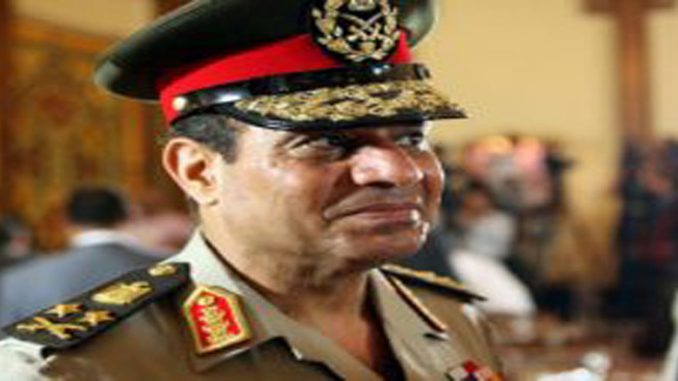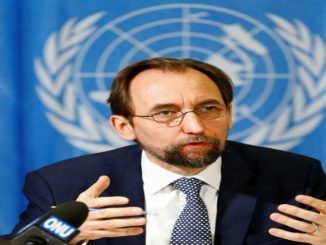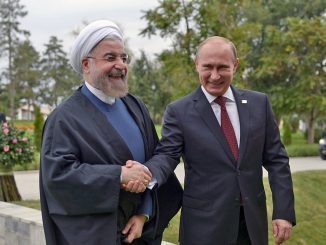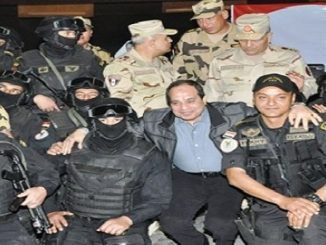
As presidential elections seem closer in Egypt, polarization increases. Egypt’s presidential election, scheduled to take place between February and May 2018. There is no doubt that Abdel Fattah al-Sisi’s victory is assured as the general turned dictator has abolished all forms of political freedom that emerged on January 25th Revolution in 2011.
In 2013, the revolution’s dreams have faded when Abdel Fatah al-Sisi, Egypt’s former defense minister, led a bloody military coup against Mohamed Morsi, Egypt’s first democratically elected President .
According to Carnegie, “State policies have fragmented and weakened the opposition. For instance, the 2015 electoral laws put smaller parties at a disadvantage, forcing them to compete for resources and giving them less representation in a weak parliament dominated by the pro-Sisi Tahya Misr coalition. The Islamist opposition is in even more disarray. Its largest political entity, the Muslim Brotherhood, is banned and labeled as a terror group.”Moreover, Al-Sisi regime has launched massive crackdown against political activists, journalist and lawyers.
The Same Misleading Propaganda Slogans
Al-Sisi started to arrange his lines to launch the propaganda for his electoral campaign.Today politicians, celebrities and lawmakers will gather at a luxury Cairo hotel to launch Abdel Fattah al-Sisi’s re-election campaign.
Abdel Nabi Abdel Sattar, an activist who is spearheading the “Continue Sisi” campaign, said, “It aims to gather 30,000 signatures for a petition urging Sisi to run for a second term in the 2018 presidential election.”
Abdel Sattar said, “We want him to continue his difficult mission of fighting terrorism and reviving the economy.”
In the same context, members of the Egyptian parliament are also launching a campaign to support Sisi’s re-election. Led by parliament’s pro-Sisi majority bloc “In Support of Egypt” and other lawmakers from various political affiliations, including members of the liberal Free Egyptians and El Wafd parties, the “Let’s Build Together”campaign aims to spread public awareness about al-Sisi’s so called achievement in his first term.
However, al-Sisi’s national mega projects where named as being “misleading ” by many Egyptians. On the top of the list of large-scale projects implemented during Sisi’s first term in office is the new Suez Canal inaugurated by Sisi amid much fanfare in August 2015.
The government had hoped the $8.2 billion venture — completed within the short span of one year — would resuscitate the country’s worn out economy by boosting foreign currency earnings. Two years on, the project has yet to fulfill the government’s promise of higher revenues.
A plunge in global trade and use of alternative shipping routes have resulted in a drop in Suez Canal revenues (from $462.1 million in August 2015 to $447.1 million in July 2017, according to figures released by the Cabinet’s Information and Decision Support Center).
Nevertheless, the authorities remain confident that the project will yield economic benefits once the Suez Canal region has been developed as planned, to include an industrial zone. But many Egyptians now see the venture as a state” propaganda stunt” and complain that the money could have been put to better use.
Mamdouh Hamza, civil engineer and an outspoken critic of the government, said “The name ‘new Suez Canal’ is misleading.” He added, “Rather than dig a new waterway as the project’s title suggests, a “bypass” was added to the existing shipping lane to allow two-way traffic. The new canal is simply an expansion of the old canal.” Hamza said, “There was no pressing need for it.”
Moreover, Hamza also criticized plans for as new administrative capital currently under construction as “yet another unnecessary undertaking.” The new city, located 28 miles to the east of Cairo and which will cost a staggering $45 billion, has been described by al-Sisi as “a first step in building a modern state.”
However, Hamza argues that “Cairo, a vibrant city with a rich heritage dating back thousands of years, is irreplaceable. ” He believes the project is “a cover for the prospective sale of heritage villas and other property in Cairo to wealthy businessmen from the Gulf for million-dollar profits that would likely go to the government’s coffers.”
In fact, many Egyptians share his skepticism about the government’s motives for the new capital.
On October 11, at a ceremony marking the end of the first phase of the project, al-Sisi dismissed criticism of the venture, insisting that “the skeptics are ignorant of the facts.”
Fragmented Opposition Against the “Regime’s failed Projects”
Hamza, who rejects Sisi’s re-election bid, is preparing to launch “a democratic civil movement” aimed at opposing what he called “the regime’s failed policies.” The initiative, to be announced in the coming days, “will unite the fragmented opposition” and “give its backing to any candidate running against Sisi in the next election, provided that that contender is committed to realizing the goals of the 2011 Revolution and shares our aspirations for a secular, civil state.”
It is worth to mention that Hamza, other opposition figures and human rights organizations have pointed out that the government’s “intensifying crackdown on dissent” is a proof of “the insecurity of the current leadership.” They say the arbitrary arrests and detention of thousands of opponents of varied political stripes that have taken place since the July 2013 and rampant inflation are costing Sisi his popularity.
In addition, critics also question al-Sisi’s ability to restore stability and security. They believe that “the government’s repressive policies are fueling terrorism.”
It is worth to mention that the Islamist insurgency that rages on in northern Sinai is causing casualties among the security forces on a near-daily basis and the attacks have spilled over into the mainland. In the same context, Egypt’s minority Coptic community were also the target of various terrorist attacks. The latest in a series of deadly assaults on Christians in Egypt has sparked outrage among the Christians who are living now in fear after losing faith in the government’s ability to protect them.
Al-Sisi’s Elections is Another “Mubarak’s Nostalgia “
In August, Sisi said he would contest the 2018 election “if that is the will of the Egyptian people.” He is widely expected to win, albeit with far fewer votes than in 2014. In fact, many see his potential victory as :”a done deal”: rather than a manifestation of the will of the people.
Nothing has changed, but it is another form of Mubarak’s election’s nostalgia .
“During the Mubarak era, election fraud was the norm and was expected even,” Isham Qassem, a publisher and political analyst. “Voters were offered rice and sugar in exchange for their votes.
In fact, we are now seeing new election manipulation tactics: Votes for Sisi are guaranteed by way of incentives offered to certain groups such as election monitors or by salary increases for the police force and others.
Furthermore, potential rival secular candidates, even those with only a slim chance of winning, are already facing intimidation, and the pro-government press has mounted smear campaigns against them.”
Last September, Khalid Ali, a prominent human rights lawyer who is widely perceived as Sisi’s top contender for the 2018 election, was sentenced to three months in prison after a court found him guilty of “violating public decency.”
His conviction is related to a photograph that shows him allegedly making an obscene hand gesture as he celebrated the reversal of a controversial government decision to hand over two Red Sea islands to Saudi Arabia.
Amnesty International said that if confirmed on appeal, his conviction will be “politically motivated,” that would prevent him from running in the election.
According to Qassem, “the restrictive political climate can an only result in an election that has “puppet candidates” running against al-Sisi to legitimize the vote, warning of a serious public backlash if this happens.
Sources : Al monitor – carnegie



